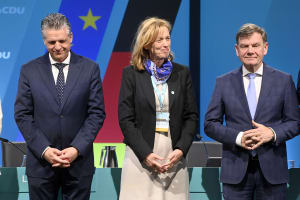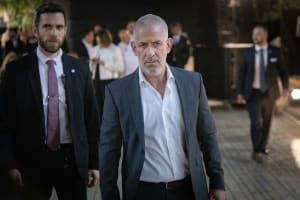Herzog visits Netanyahu in hospital for 'emergency meeting', seeks compromise on controversial bill
Dueling protest rallies as Knesset moves forward with vote on Reasonableness bill

Upon return from his official visit to Washington on Sunday, Israeli President Isaac Herzog rushed to Sheba Medical Center on Sunday night to speak with Prime Minister Benjamin Netanyahu, who was in recovery following a procedure to implant a pacemaker.
Herzog's visit to the prime minister was a final effort to achieve a compromise between the coalition and opposition ahead of Monday’s vote to pass the Reasonableness Standard Bill, according to a statement from the President's Office.
“This is a time of emergency. An agreement must be reached,” Herzog said in the statement.
"All the time, and also during his visit to the U.S., the president and his team are working to explore all efforts for dialogue with the aim of reaching an agreement between the parties,” the statement said.
Herzog also met with opposition leaders Yair Lapid and Benny Gantz, as he sought to avoid further escalation in the political conflict.
According to a local N12 news report, a major point of contention is the opposition’s demand for a freeze on judicial reform legislation for one-and-a-half years as part of a compromise.
Netanyahu’s Likud party is reportedly willing to agree to a six-month freeze, which would include a Knesset recess.
On Sunday night, there were dueling protest rallies in Jerusalem and Tel Aviv.
While Tel Aviv is usually the site of opposition protests, this time the rally took place at the site of a pro-reform demonstration.
A group of coalition supporters, numbering at least 60,000, gathered in Tel Aviv to call on the coalition to pass the reforms in an event with the slogan: “The people are with you, complete the legislation — 64 seats are not second class,” referring to the full 64 seats in the Knesset.
Many in the coalition have accused their political opponents of racial and class bias, claiming that the majority of the opposition are secular Jews from an Ashkenazi (Northern European) background, often from the upper class.
Those leading the judicial reform, including Netanyahu, Justice Minister Yariv Levin and the chair of the Knesset's Constitution, Law and Justice Committee, Simcha Rothman, are notably all Ashkenazis, while coalition supporters are largely middle class from a Sephardi (Spanish/North African) or Mizrachi (Middle Eastern) background.
After 29 weeks of almost entirely pro-opposition protests, coalition supporters are now trying to make a show of force ahead of the vote.
Amid cries of “Stop the refusal,” judicial reform supporters demanded the coalition proceed with the vote and not be swayed by opposition protests.
Israeli Finance Minister Bezalel Smotrich, Education Minister Yoav Kisch and Transportation Minister Miri Regev addressed the crowd of supporters.
“We’ve been saying for a long time that the people want judicial reform. Now let’s correct that a little: The people deserve judicial reform,” Smotrich told the attendees.
He also said the coalition will continue to seek compromise while pushing forward with the reforms.
“The fixes to the justice system are meant to strengthen democracy and fulfill the people’s will. We were elected to implement a policy. I promise we will continue to talk with the opponents to remain one nation — there are no winners or losers.”
Levin, who addressed the crowd via video, said that compromise “requires the opposition to make concessions.”
"The situation whereby only one side holds the key roles in the judicial system, that situation will not continue,” he said.
U.S. President Joe Biden again called on Netanyahu to delay the legislation until a compromise can be reached.
“Given the range of threats and challenges confronting Israel right now, it doesn’t make sense for Israeli leaders to rush this — the focus should be on pulling people together and finding consensus," said Biden.

The All Israel News Staff is a team of journalists in Israel.














